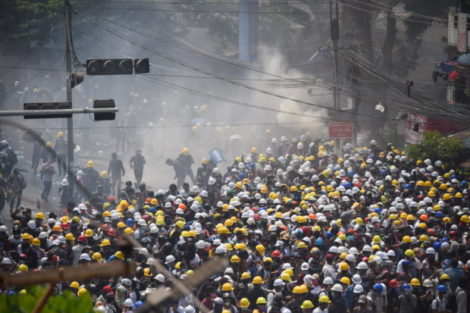Myanmar shutdown marks grim year for web freedom

People participate in a protest against the military coup in Yangon, Myanmar, on March 2, 2021. Picture was taken from behind a window. REUTERS FILE PHOTO
PARIS — Internet users in a record number of countries have faced arrest and physical attacks for their posts over the past year, a report said on Tuesday, painting a grim picture of digital freedoms in 2021.
The annual “Freedom on the Net” report said internet shutdowns in Myanmar and Belarus had proved particular low points as online rights declined globally for the 11th year in a row.
Compiled by US think-tank Freedom House, the survey gives countries a score out of 100 for the level of internet freedom enjoyed by citizens, including the extent to which they face restrictions on the content they can access.
Other factors include whether pro-government trolls seek to manipulate online debates.
“This year, users faced physical attacks in retribution for their online activities in 41 countries,” the report said, a “record high” since the tracking started 11 years ago.
Examples included a Bangladeshi student hospitalized after a beating for alleged “anti-government activities” on social media, and a Mexican journalist assassinated after posting a Facebook video accusing a gang of murder.
The report also found that people had been arrested or convicted for their online activities in 56 out of the 70 countries covered by the report — a record 80 percent.
They included two Egyptian influencers jailed in June for sharing TikTok videos that encouraged women to pursue careers on social media platforms.
Internet blackouts
Myanmar was singled out for heavy criticism in the report after a military junta seized power in February and shut down the internet, blocked social media and forced tech companies to hand over personal data.
Internet shutdowns were similarly used to cut communications ahead of Uganda’s elections in January and after a disputed Belarus election in August last year.
In total, at least 20 countries blocked people’s internet access between June 2020 and May 2021, the period covered by the survey.
But it wasn’t all bad news, with The Gambia among countries praised for continuing its trend of greater online freedom since dictator Yahya Jammeh was ousted in 2017.
Iceland topped the ranking, followed by Estonia and Costa Rica, the world’s first country to declare internet access a human right.
China worst offender
At the other end of the spectrum, China was named the world’s worst abuser of internet freedoms, handing out heavy prison sentences for online dissent.
But there were bright spots, with the report noting that audio app Clubhouse provided an “unprecedented space for users to discuss sensitive issues with people outside of mainland China” until Beijing blocked it in February 2021.
Worldwide, the researchers accused governments of using regulation of tech companies for repressive purposes.
“In the high-stakes battle between states and technology companies, the rights of internet users have become the main casualties,” the researchers said.
Numerous governments are pursuing laws that curb the vast power of tech giants like Google, Apple and Facebook — some of which is a justified bid to prevent monopolistic behavior, the report said.
But it called out nations including India and Turkey for passing legislation ordering social media platforms to remove content deemed offensive or which undermines public order, often under “vaguely defined” terms.
Legislation that forces tech giants to store local data on local servers, supposedly in the name of “sovereignty”, is also on the rise — and is open to abuse by authoritarian governments, the report warned.
Under a draft law in Vietnam, for example, authorities can access people’s personal data under “vaguely defined pretexts related to national security and public order”.